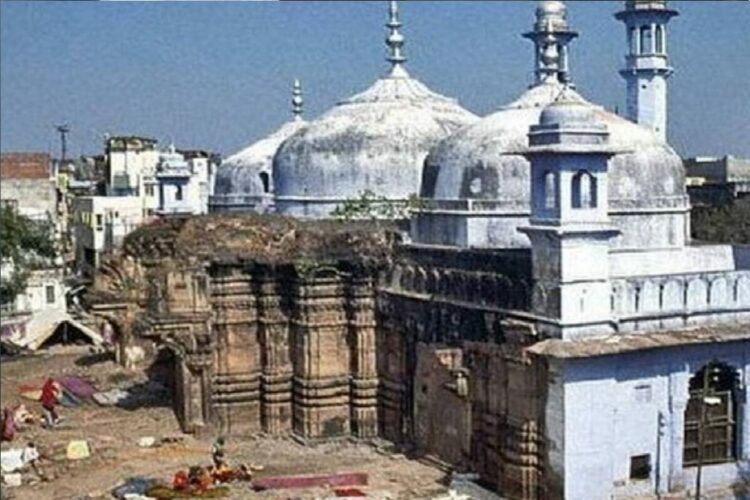The Allahabad High Court dismissed the Masjid Committee’s plea seeking a revision of the trial court’s order dated September 12, 2022, which held that the Hindu side’s plea seeking worshipping rights inside the Gyanvapi premises was maintainable. Justice JJ Munir reserved judgement in December 2022 after hearing the arguments of both parties at length.
The Muslim side filed the plea under Order 7, Rule 11 of the Civil Procedure Code before the trial court. The court held the Hindu side’s was maintainable as it is not barred by the Places of Worship Act, 1991, The Waqf Act, 1995 and the UP Shri Kashi Vishwanath Temple Act, 1983.
The Varanasi District Judge Ajay Krishna Vishwesha said, “In the present case, the plaintiffs are demanding right to worship Maa Sringar Gauri, Lord Ganesh, and Lord Hanuman at the disputed property, therefore, Civil Court has jurisdiction to decide this case. Further, according to the pleadings of the plaintiffs, they were worshipping Maa Sringar Gauri, Lord Hanuman, Lord Ganesh at the disputed place incessantly since a long time till 1993,” in the September 12 order.
“After 1993, they were allowed to worship the above mentioned Gods only once in a year under the regulatory of State of Uttar Pradesh. Thus, according to plaintiffs, they worshipped Maa Sringar Gauri, Lord Hanuman at the disputed place regularly even after 15th August, 1947. Therefore, The Places of Worship (Special Provisions) Act, 1991 does not operate as bar on the suit of the plaintiffs and the suit of plaintiffs is not barred by Section 9 of the Act,” he held. Thereafter, the Muslim side moved the Allahabad High Court seeking a revision of the trial court’s order in October 2022.
Varanasi Court’s order
Five women filed the petition before the Varanasi Court seeking permission for daily worship of Hindu deities whose idols are said to be located on an outer wall of the Gyanvapi complex, which is located close to Kashi Vishwanath temple. The petitioners submitted before the trial court that the self-styled Jyotirling of Lord Vishwanath in Kashi is in the mosque complex.
Furthermore, the petitioners had submitted to the trial court that Mughal Emperor Aurangzeb had destroyed a portion of the Kashi Vishwanath temple in 1669 and had built the Gyanvapi Mosque. The petition further sought that the court declares that Muslims have no right to occupy the Gyanvapi complex and their entry to be banned. The Muslim side had argued that there was no temple in the Gyanvapi premises and that the mosque is standing on the site from the beginning.
Varanasi Court Consolidates All Cases Related to Gyanvapi
On May 23, Varanasi Court allowed an application seeking the consolidation of 8 suits concerning the Gyanvapi dispute pending before various courts. District Judge Ajaya Krishna Vishvesha observed that all these cases must be consolidated and tried together. Therefore, all cases concerning the Gyanvapi dispute will be heard together by a District Judge’s court.
“I am of the opinion that it will be expedient in the interest of justice that all the suits mentioned above…should be tried together and may be consolidated and all these suits and proceedings shall be decided upon the evidence in any of such suits or proceedings,” the judge said.
The application for consolidation of similar cases was moved urging the court to consolidate the cases in order to save public time and money and avoid difficulties of legal nature. Furthermore, the court said that the case of Rakhi Singh and others Vs State of UP and others “shall be the leading case and evidence shall be recorded in the leading case.” In the Rakhi Singh case, the plaintiffs are seeking the right to worship Bhagwan Shringar Gauri and other deities in the Gyanvapi Mosque compound.
It is pertinent to note that on May 22, the Muslim side submitted an application to the Varanasi Court claiming that Mughal emperor Aurangzeb was not cruel. The Muslim side filed the application opposing the Hindu side’s plea seeking an ASI survey of Gyanvapi premises.
“Neither Mughal emperor Aurangzeb was cruel, nor did he demolish any Lord Adi Vishweshwar Temple in Varanasi,” said the application. The Muslim side denied the averments claiming Muslim invaders attacked and destroyed the Bhagwan Adi Vishweshwar Temple, which was later restored by Raja Tondal Mal at the same place in 1580 AD. The application submits that there is no concept of two Kashi Vishwanath temples in Varanasi.
Furthermore, the Muslim side has also objected to the reference to Muslim rulers as invaders, claiming that it was made with the aim to create hatred between Hindus and Muslims.
“The structure or building which is present on the spot, Masjid Alamgiri / Gyanvapi Masjid, has been there for thousands of years, it was a mosque yesterday and is still a mosque, and the Muslims of Varanasi and neighbouring districts, as a matter of right, without any restrictions, have been offering Namaz Panjgana and Namaz Zuma and Namaz Idaan,” the application stated.
The Muslim side also reiterated its claim that the ‘Shiva Linga’ found inside the Wazukhana is a fountain instead. The application prays that the Hindu side’s plea for an ASI survey of the Gyanvapi premises is rejected, as it can be ascertained from photographs that the disputed structure is a Mosque. Furthermore, the application claims that the collection of evidence by a commission or through a scientific probe is impermissible under law.




















Comments